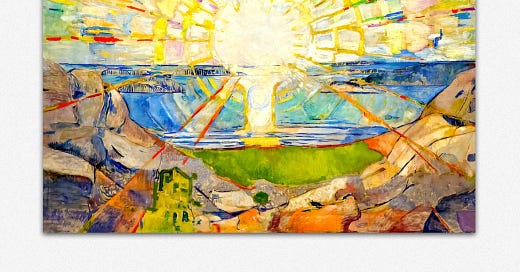'The Truth must dazzle gradually'
Every few months we feature a poem by Emily Dickinson, a LitHits favorite. This poem, about truth-telling, is short on words but rich in subtlety--and disturbingly relevant to today
Tell all the truth but tell it slant — Success in Circuit lies Too bright for our infirm Delight The Truth's superb surprise As Lightning to the Children eased With explanation kind The Truth must dazzle gradually Or every man be blind —
What we love about this poem…
The idea that it’s best not to tell the truth but to ‘tell it slant’—soften it, make it more bearable—directly contravenes the ethical foundation of our interactions as human beings. It’s startling to be told that we frail mortals can’t really stand the truth and that it’s better to have it rendered gentler and less scorching, no matter what that ‘truth’ is. There’s a suggestion of moral relativism that is strikingly in tune with many of Dickinson’s contemporaries, as we outline below in the ‘To Read Alongside’ section.
How might this poem go down now, if it were written today? Is it an invitation to ‘fake news’, partial truths, excuses for failings? Looking at it from our vantage point, the poem can seem both prescient in anticipating a 'post-Truth’ era and outdated in its assumption of something we all might agree on as ‘Truth’ in the first place.
About the Author
Emily Dickinson (1830-86) is one of the most important and innovative American poets. She spent most of her life in Amherst, Massachusetts, living reclusively but writing constantly, both poetry and letters. Her work was published after her death and became an instant success.
She once described the power of poetry as something that ‘takes the top of your head off’.
Dickinson is a popular choice for us, and you can read past newsletters featuring her poems: ‘This World is not Conclusion’, ‘The Brain is Wider than the Sky’, ‘Hope is the Thing with Feathers’, and ‘There’s a Certain Slant of Light’ — this last one featuring another interesting use of the word ‘slant.’
To read alongside…
The idea of truth being too much to handle comes up a lot in the plays of Henrik Ibsen. His 1882 play An Enemy of the People gets to the heart of the problem by featuring a doctor who is trying to save his town’s livelihood being gagged and pilloried by his fellow citizens because the truth he has discovered—that the water in the town’s lucrative spa is polluted—threatens their economic welfare. The doctor proudly and defiantly stands up for his discovery even though, at the end, he is barricaded in his home with rocks being hurled at his windows by the townspeople. ‘The minority is always right!’ he insists. ‘The strongest man is he who stands most alone.’ In many productions at the time, the actor playing the doctor was made to look exactly like Ibsen.
But in his next play, The Wild Duck (1884), Ibsen did an about-face and satirized himself by having a self-righteous truth-teller destroy an entire family by insisting on revealing the facts of a child’s parentage. What does this meddling revelation of the truth achieve? Like Dickinson’s poem, Ibsen’s plays pose hard questions without giving easy answers. A key concept in the play is the need for a ‘life-lie’ to sustain us because we are too weak to withstand the truth.
Edward Albee’s play The Goat; or, Why is Sylvia? was directly inspired by Ibsen’s The Wild Duck and pushes this idea of the destructiveness of truth-telling for its own sake to even further extremes.
Suggest a LitHit!
Tell us your own favourites from literature you've read, and we can feature you as a Guest Curator. Just email us with the following information:
Your full name
The title of the book you're suggesting
The location of the excerpt within the book (e.g., "in the middle of chapter 5"), or the excerpt itself copied into the email or attached to it (in Word)
Why you love it, in just a few sentences
About LitHits
LitHits helps you make time for reading by bringing you unabridged excerpts from brilliant literature that you can read on the go, anytime or any place. Our curators carefully select and frame each excerpt so that you can dive right in. We are more than a book recommendation site: we connect you with a powerful, enduring piece of literature, served directly to your mobile phone, tablet or computer.
You might also enjoy...
Feedback
We'd love to hear your thoughts on our newsletter:
kshepherdb@yahoo.co.uk
Graphic design by Sara Azmy
All curation content © 2024 LitHits. All rights reserved.




